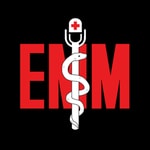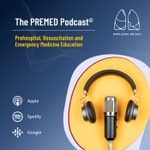The Resus Room – Details, episodes & analysis
Podcast details
Technical and general information from the podcast's RSS feed.

The Resus Room
Simon Laing, Rob Fenwick & James Yates
Frequency: 1 episode/13d. Total Eps: 263

Recent rankings
Latest chart positions across Apple Podcasts and Spotify rankings.
Apple Podcasts
🇨🇦 Canada - medicine
28/07/2025#52🇬🇧 Great Britain - medicine
28/07/2025#9🇬🇧 Great Britain - healthAndFitness
28/07/2025#62🇨🇦 Canada - medicine
27/07/2025#60🇬🇧 Great Britain - medicine
27/07/2025#7🇬🇧 Great Britain - healthAndFitness
27/07/2025#50🇨🇦 Canada - medicine
26/07/2025#35🇬🇧 Great Britain - medicine
26/07/2025#5🇬🇧 Great Britain - healthAndFitness
26/07/2025#43🇨🇦 Canada - medicine
25/07/2025#77
Spotify
No recent rankings available
Shared links between episodes and podcasts
Links found in episode descriptions and other podcasts that share them.
See all- https://twitter.com/laing_simon
47 shares
- https://twitter.com/robfenwick
45 shares
- https://twitter.com/heli_med_james
23 shares
RSS feed quality and score
Technical evaluation of the podcast's RSS feed quality and structure.
See allScore global : 53%
Publication history
Monthly episode publishing history over the past years.
September 2024; papers of the month
dimanche 1 septembre 2024 • Duration 35:51
Welcome back after the summer break!
Three more papers for you to feast your ears on this month and as always make sure you go and check them out yourselves after you've had a listen!
First up, following on really nicely from the DOSE-VF paper on dual sequential defibrillation we take a look at the paper that looks at the association between shock interval and VF termination. We might be biased but this shines a light on an area that could make a huge difference to the outcomes for patients with refractory VF!
Next; when you're seeing a patient with an upper GI bleed, which scoring/prognostication tool do you use and is it the best? We cover a paper that looks at exactly this question.
Finally we look at whether TXA predisposes patients to a higher risk of venous thromboembolism and whether it might affect our practice patterns.
Once again we’d love to hear any thoughts or feedback either on the website or via X @TheResusRoom!
Simon & Rob
August 2024; papers of the month
jeudi 1 août 2024 • Duration 31:49
The UK REBOA trial left many with doubts over its utility for trauma patients in ED. The time from injury to its use was around 90 minutes and the trial was stopped when it didn't reduce and maybe even increased mortality compared to standard care alone.
But what effect does REBOA have when used prehospitally and how feasible is it? Our first paper, from London HEMS, looks at this and gives a fascinating insight into it's use and the physiological response seen with it.
We've recently looked at dual sequential defibrillation for refractory VF with the DOSE-VF trial. Our second paper this month looks at how a double defibrillator strategy, in the context of cardioversion for AF, may affect restoration of sinus rhythm in obese patients.
Finally we take a look at the use of video livestreaming from scene to EMS, in a feasibility RCT. How can it affect accurate dispatch of the most appropriate resources and what impact does it have on those that use it?
Once again we’d love to hear any thoughts or feedback either on the website or via X @TheResusRoom!
Simon & Rob
End Tidal CO2; Roadside to Resus
jeudi 14 mars 2024 • Duration 53:02
End Tidal CO2, or ETCO2 for short, is something that’s talked about pretty often in Emergency and Critical Care and that’s because it’s used a lot in the assessment and treatment of patients!
It’s got a big part to play in airway management, resuscitation, sedation and is also increasingly used in other situations. Some of these applications have some pretty strong evidence to back them up but others are definitely worth a deeper thought, because without a sound understanding of ETCO2 we can fall foul of some traps…
ETCO2 is a non-invasive measurement of the partial pressure of CO2 in expired gas at the end of exhalation. Ideally we’d like to know what’s really going on arterially with the partial pressure of arterial CO2 but we can use the end tidal because that’s an easy reading to get from exhaled breath, when it will most closely resemble the alveolar CO2 concentration.
Its value is reflective of ventilation but also really importantly is affected by the circulation, the circuit and how it’s applied. In the podcast we run through all of these aspects, its application to clinical care and also some of its pitfalls.
Once again we’d love to hear any thoughts or feedback either on the website or via X @TheResusRoom!
Simon, Rob & James
Transfer; Roadside to Resus
lundi 25 mai 2020 • Duration 01:05:36
Transfers of patients happen all the time. It's easy to think about transfers as only those that involve an ambulance and moving patients from one hospital to the next, but in reality it's far more extensive than that. We all move patients all the time, whether that be the unwell patient in the upstairs of their house to the ambulance, the patient in the Emergency Department to the CT scanner or another ward, or the more traditional interhosptal transfer.
Transfers of patients are inherently high risk times for the patient and having some background knowledge on transfers and a structured approach helps us ensure the best possible care for our patients. In this episode we run through transfers with the help of an expert on the topic, Scott Grier a Consultant in Intensive Care Medicine and Anaesthesia at Southmead Hospital in Bristol, the South West Critical Care Network Lead for Transfer, and a PreHospital Critical Care Doctor with GWAAC.
Enjoy!
Simon, Rob and James
May 2020; papers of the month
vendredi 1 mai 2020 • Duration 23:12
Welcome to May's papers of the month podcast. Hope you are all well and keeping safe.
This month James joins Simon to discuss some of the great work published following the London Trauma Conference, all available in the hyperlinks on the website.
First up we have a look at the incidence of prehospital hypotension and hypoxia in patients with suspected traumatic brain injury and the ways in which we might look to mitigate against these complications. Next we have a think about end-tidal CO2 levels and the correlation between these and arterial CO2 readings and discuss what the findings might mean for our practice. Finally we have a look at the incidence of hyperoxia in patients receiving a prehospital emergency anaesthetic in the context of trauma, and consider the effect this might have on our patients and again practice.
We'd love to hear any thought or comments you have either on the website or via twitter @TheResusRoom.
Enjoy!
Simon & James
Pelvic Injury; Roadside to Resus
lundi 20 avril 2020 • Duration 57:46
Fractures of the pelvis are found reasonably often in major trauma, but they’re a really challenging presentation. They are difficult to assess and accurately diagnose in the prehospital setting, mortality rates are high, particularly in patients with haemodynamic instability and there are often associated injuries. Associated mortality from patients with pelvic fractures who reach hospital is reported to be up to 19%, with mortality rates as high as 37% reported in the presence of haemodynamic instability.
In this episode we'll run through pelvic injuries, all the way from anatomy and mechanisms of injury, to assessment and management.
As always make sure you have a look at the references and supporting material attached in the show notes, and get in touch with any questions or comments and take care of yourselves.
Enjoy!
Simon, Rob and James
Respiratory Strategies in COVID-19
vendredi 10 avril 2020 • Duration 17:36
So COVID-19 has produced a multitude of challenges to healthcare providers, the response to these challenges has been phenomenal.
One uncertainty is the strategy we should employ for hypoxic respiratory failure and several high quality guidelines have presented conflicting advice for the severely hypoxic patient.
The Warwick Clinical Trials Unit has already begun recruiting patients to their RECOVERY-RS trial, which is open for hospitals in the UK to sign up for. This looks at 3 different strategies of respiratory support for patients admitted with suspected or known COVID-19 and hypoxia; namely CPAP, High-flow nasal oxygen and standard care. The trial is funded by the NIHR and supported by the Intensive Care Society.
In this episode we get a chance to speak to Bronwen Connolly, one of the investigators of the RECOVERY-RS trial; we discuss the background evidence, the trial design, and when results will be available.
As always we’d love to hear any thoughts or comments you have on the website and via twitter, and make sure you take a look at the protocol yourself.
Enjoy!
Simon, Rob & James
April 2020; papers of the month
mercredi 1 avril 2020 • Duration 32:57
First we hope you're all well. The world has changed dramatically over the the last few weeks and you are all doing a phenomenal job of providing healthcare under extremely challenging circumstances.
We are determined to add a bit of normality to life with a non-COVID-19 papers of the month, full of bad jokes and some EBM. This month we're looking at intubation of acute alcohol intoxication in ED. We take a look at a paper that tries to quantify the risk of patients developing an intracerebral injury when taking antiplatelets and anticoagulants. Finally we have a look at the value of clinical examination and imaging findings in patients with elevated intracranial pressure, how valuable are individual findings?
Most importantly take care of yourselves and loved ones and keep fighting the good fight!
Simon & Rob
Cutting Edge PHEM; Roadside to Resus
mardi 17 mars 2020 • Duration 51:08
Excellent practice is led by following the high quality evidence based medicine, and there have been a lot of great papers published in the last 12 months!
We were kindly invited to the Faculty of Pre Hospital Care Annual Scientific Conference to give a talk on the top 10 papers over the last year.
Sadly, but completely understandably, the conference had to be cancelled due to COVID-19. In this podcast we cover the talk which is based on 2 cases that are common to PHEM;a major trauma and a cardiac arrest, and discuss how we can optimise outcomes for our patients in view of the recent evidence on these areas.
As always we’d love to hear any thoughts or comments you have on the website and via twitter, and make sure you take a look at the references and guidelines linked below to draw your own conclusions.
Enjoy!
Simon, Rob & James
March 2020; papers of the month
dimanche 1 mars 2020 • Duration 31:45
We've got a great spread of topics for you this month, stretching all the way from Prehospital Critical Care, to core Emergency Medicine topics.
Those of us seeing 'non-specific' complaints will appreciate how difficult they can be to diagnose and manage effectively. We have a look at a paper that helps characterise this group and give some context to their mortality risk. This may well help inform conversations and decision making with this patient group.
Recent literature has looked at a more conservative management for traumatic pneumothoraces, but what about those that are spontaneous? The British Thoracic Society has guidelines for how we should deal with them but a recent RCT in the New England Journal of Medicine looks at an even more conservative approach for our patients; can we decrease the number of aspirations and drains that we are performing?
Finally we've covered recently a paper on the topic of Prehospital Critical Care on the outcomes for patients in cardiac arrest, in this episode we have a look on their impact in trauma patients and hear from the lead author Ali Maddock on the implications of the study's findings.
Enjoy!
Simon & Rob









